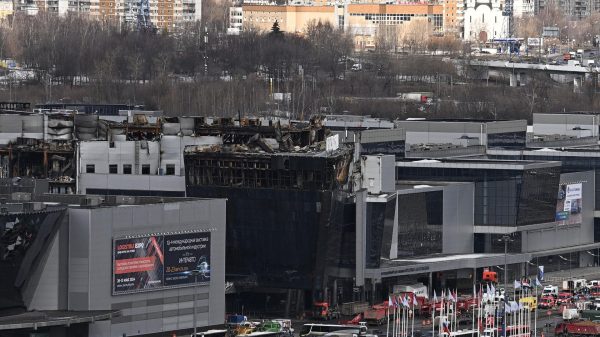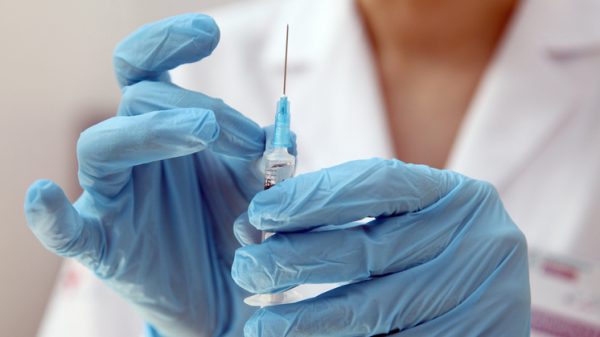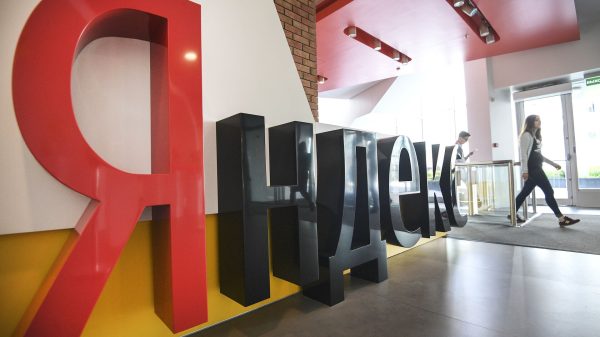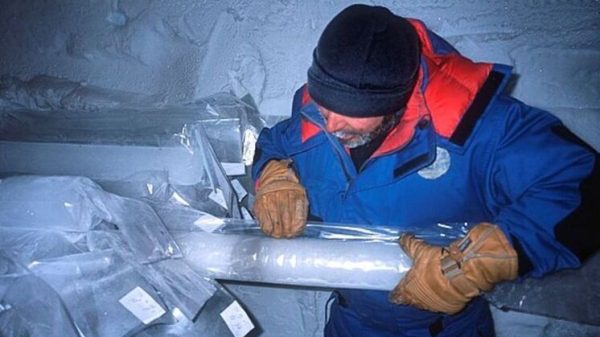 Navalny was arrested after an anti-corruption rally in Moscow, 2017. Photo: Getty
Navalny was arrested after an anti-corruption rally in Moscow, 2017. Photo: Getty
The last trial of Alexei Navalny began on June 19 in IK -6 high security about 150 miles east of Moscow. Already serving a nine-year sentence for various fabricated crimes, Vladimir Putin's latest heavyweight political opponent faced another 30 years for allegedly inciting and financing extremism and «rehabilitating Nazi ideology» — a clear reference to his support for Ukraine.
The process was briefly broadcast on a barely audible video broadcast in a separate room for journalists. Navalny, in a black prison uniform, reproached the judge for his «seriously limited» independence and for not letting his parents into the courtroom. He said he was given 3,828 pages of documents detailing the crimes he allegedly committed while in lockdown in prison, but protested, «Although it is clear from the size of the volumes that I am a sophisticated and persistent criminal, it is impossible to know exactly what I am accused of.» The judge ruled that the rest of the trial would take place behind closed doors.
33-year-old Kira Yarmysh, Navalny's press secretary and one of his closest aides during the tumultuous past decade, viewed the images in a secret hideout somewhere She told me in a Zoom interview two days later that she was upset by how thin her boss had lost, but reassured that he hadn't lost his fearlessness, defiance, or sense of humor.
 Kira Yarmysh in a replica of Navalny's prison cell, part of an exhibition in the Netherlands, March 2023. Photo: REUTERS/Anthony Deutsch
Kira Yarmysh in a replica of Navalny's prison cell, part of an exhibition in the Netherlands, March 2023. Photo: REUTERS/Anthony Deutsch
So, Putin's scourge, Russia's most famous political prisoner, a man whom Putin refuses to name, was not broken by 30 months of extreme physical and psychological deprivation in custody, I asked. “Definitely not,” she replied. “He is probably the most optimistic person in all of Russia at the moment.”
Yarmysh's morale also remains unwavering, although she, too, paid a heavy price for Navalny's support.
She sat next to him when he famously got poisoned on a flight from Tomsk to Moscow in 2020. She also accompanied him when he returned to Moscow after convalescing in Germany along with his wife Yulia, only to witness his arrest upon arrival. . Yarmysh herself was behind bars four times, was under long-term house arrest and now lives in indefinite exile from her homeland.
This personable and eloquent young woman, however, firmly believes that Navalny will one day lead a new, free and prosperous Russia.
“I wouldn’t do what I do if I didn’t have this faith,” she said. “I sincerely believe that historical justice is on our side. Putin will fall sooner or later, and I do not see anyone more suitable or capable of becoming president than Alexei.
As she spoke—Navalny is incarcerated, the war in Ukraine is distracting Western attention, and Moscow is ruthlessly crushing all dissent—it seemed hopelessly optimistic. But then, two days after our interview, Yevgeny Prigozhin, head of the Wagner mercenary group, led a dramatic and apparently rebellious assault on Moscow before making a mysterious deal with the anxious Russian president. The extraordinary episode exposed Putin's fragility, and Yarmysh's optimism suddenly became less far-fetched.
Navalny
Yarmysh grew up in a middle-class family in the very city that Prigozhin captured, Rostov-on-Don. Incredibly smart, she earned a place to study journalism at the elite Moscow State Institute of International Relations (MGIMO) by winning the national TV quiz.
After graduation, she worked in the public relations department of the Pushkin Museum im. A.S. Pushkin, then in a Russian airline. She could do well in Putin's corrupt Russia, she says. While under house arrest in 2021, she watched one of her former MGIMO classmates host Putin's annual TV show with the Russian public. “It could have been me,” she laughs.
But the rigged parliamentary elections in December 2011 forced her to take a different path.
“I was very furious that [for] once in my life I tried to be a decent citizen and participate in elections, and everything was in vain,” she tells me in almost perfect English. She joined the mass protest and found it a joyful, liberating experience. “I was happy that I was able to turn my anger into something. At least I could protest and be seen.”
She participated in other protests. In 2013, she volunteered to help Navalny campaign for mayor of Moscow (he came in second with 27% of the vote and was never allowed to stand in the next election). The following year, she applied to be his press secretary. He was under house arrest at the time, so she got the job after interviewing his staff.
It was several months before she actually met her tall, charming boss with his charming wife Yulia and children Daria. and Zakhar, on one of his many trials. She was impressed.
“He was charismatic and radiant with energy,” she recalls. She soon became a key player in his campaign to expose the corruption of Putin's henchmen and create a national political organization through the skillful use of social media. > Navalny with (left to right) daughter Daria, son Zakhar and wife Yulia Photo: Getty
Her first five days in a Moscow detention center came in February 2018, after she used a YouTube broadcast to advertise a rally in support of a boycott of that year's presidential election, which Navalny was banned from running. She sat alone in a cell and spent time reading books. It was “boring,” she says, adding that in 2023, detainees are being treated much harsher. “Now everything is different.”
Three months later, she was detained again for organizing anti-Putin rallies on the eve of his fourth inauguration. She was locked up for 25 days with several other women. With Navalny's encouragement, she turned the experience into The Incredible Events in Women's Cell 3, published in the UK last month.
In August 2020, she accompanied Navalny to Siberia to investigate corruption. They expected to be disturbed, but their visit to Tomsk was «completely calm, very peaceful … it was the best trip of my life.»
She sat next to Navalny on the return flight to Moscow. Shortly after takeoff, he felt unwell. He turned very pale and asked her to talk to him, distract him, after which he went to the toilet. Yarmysh did not suspect anything, even when the pilot asked if there was a doctor on board. Then another assistant to Navalny came running and said that he was lying unconscious on the floor of the flight attendants' kitchen and, apparently, had poisoned himself.
The pilot made an emergency landing in Omsk. Navalny was urgently hospitalized. Yarmysh had to explain to the doctors who he was and that he had been poisoned. She alerted his wife and broke the news of his poisoning on Twitter. “It was very, very scary that he would not survive, but we didn’t think about it … I just focused on my duties,” she says.
Two days later, Navalny was flown to Germany, where it was discovered that he had been poisoned by Novichok, the signature nerve agent of the Putin regime. He spent almost three weeks in a coma. While he was recuperating in the Black Forest, a team of investigative reporters from Bellingcat tracked down a group of killers. Navalny, as you know, called one of them, posing as a security officer, and forced him to admit that he had planted «Novichok» in his shorts. The absurdity of Putin's henchmen is brilliantly captured in last year's Oscar-winning documentary Navalny, as is the drama of his return to Moscow.
> Navalny addresses thousands in Khabarovsk, 2017. Photo: Evgeny Feldman
Yarmysh says there was never any doubt that he would return home despite the dangers. “It has never been a subject of discussion. Everyone understood that he would never stay anywhere but Russia.” But his team didn't believe the regime would be stupid enough to arrest him at the airport in front of the mass media. Or do it ostensibly for violating the terms of parole by leaving the country. As Yarmysh says: “He did not leave Russia without permission. He was pulled out unconscious and evacuated.”
This was the last time she saw Navalny. He was sent to Correctional Colony No. 2, but not before dealing another devastating blow to Putin's authority. Two days after his arrest, his organization FBK (Anti-Corruption Foundation) released a documentary that exposes in vivid detail the £1 billion pleasure palace that Putin secretly built for himself on the Black Sea coast.
Yarmysh was detained two days later for tweeting details of a demonstration against Putin's corruption. This time, she was held for nine days, during which the regime accused her of violating Covid rules by encouraging a rally. “It was a huge hypocrisy, because everything worked in Moscow. All concert halls, restaurants and museums were open,” she says.
She spent the next seven months under house arrest awaiting trial. She was alone in someone else's apartment, the owner kicked her out of her own apartment after her arrest: «I was too dangerous.» She was not allowed any visitors other than her lawyer, and no phone calls, internet or mail. It had an electronic tag on it. She had to persuade the policeman to take out her garbage. Two months later, she was allowed to leave the apartment for an hour a day, provided that she went no further than 500 meters.
That April, despite being under house arrest and without internet access, she spent her fourth time in a detention center after colleagues used her Twitter account to promote yet another protest rally. Ironically, those 10 days turned out to be a relatively pleasant break: she had company and was allowed to make daily 15-minute phone calls.
Four months after that, Yarmysh was found guilty of violating Covid rules and sentenced to 18 months of “restricted freedom”, during which she will be in her apartment from 8 pm to 8 am. During the break before the execution, she fled Russia.
 Kira Yarmysh was one of Navalny's closest aides during the turbulent events. past decade. Photo: Kira Yarmysh, Instagram
Kira Yarmysh was one of Navalny's closest aides during the turbulent events. past decade. Photo: Kira Yarmysh, Instagram
It was an easy decision, she said. By then, the FBK and Navalny's political party had been labeled «extremist» organizations and forcibly disbanded. Yarmysh believes that a dozen of his closest associates were arrested and sent into exile 10 times more. Abroad, at least, she and they could continue to work full-time for Navalny, exposing Putin's corruption and condemning his war in Ukraine.
Where she now lives, she won't say. Her secrecy is not because she fears for her life, but in order to deprive Putin of a propaganda weapon. «Of course, the Russian intelligence services know where I am, but if you announce your location, they will try to emphasize that you live in a NATO state or something like that.»
In the meantime, it has been posted. is wanted in Russia for evading a sentence, which means she will be arrested immediately if she tries to return home. She was also charged with posting false information about the war in Ukraine on YouTube, a crime punishable by up to 10 years in prison.
Her novel is still sold in Russia, but since she is also considered a «foreign agent», bookstores can only display it in an opaque black cover that obscures the title. According to her, the authorities tried to find evidence that he promoted LGBT topics and drug use, but “nothing happened, so I think the check was useless.”
Yarmysh’s position, of course, is nothing compared to Navalny's position. She communicates with him by old-fashioned letter, gets updates from his lawyers, and paints a grim picture of a prison regime that is clearly designed to break his spirit, if not kill him.
 Alexei Navalny at an unsanctioned anti-Putin rally in Moscow, 2018 Photo: Getty
Alexei Navalny at an unsanctioned anti-Putin rally in Moscow, 2018 Photo: Getty
He used to be able to communicate with other prisoners in colony-settlement No. 6, where he was transferred in June 2022, and even formed a trade union of prisoners that fought for the best conditions, including the right to have chairs, not stools, while working. They say that the authorities gave him an unwashed bum and a «psycho» who screamed for 17 hours a day as cellmates.
However, for the last year he has been in solitary confinement or, even worse, in a punishment cell. His alleged offenses, says Yarmysh, include walking around with no hands behind his back, improperly fastening his uniform, washing his face at the wrong time, disrespecting his guards, and proclaiming his innocence when asked about his name and infraction.
< p >She tweeted earlier this year that she «doesn't rule out» that he is being slowly poisoned due to the excruciating stomach pain he is experiencing. In April, it was reported that he had lost 8 kg in just two weeks, and an ambulance was called. But the Kremlin would only say that his health is the business of the federal penitentiary service.
Navalny's punishment cell is tiny, only six square meters. It has one small closed window overlooking the courtyard and no ventilation. His bunk is attached to the wall from 5 am to 10 pm. He can't lie on the floor. The only furniture is a stool. There is no hot water. The light is never turned off. He is forced to listen to non-stop Russian state radio and Putin's endless speeches. “Another torture because he can’t turn it off,” says Yarmysh.
 Copy of Navalny’s prison cell. : getty
Copy of Navalny’s prison cell. : getty
He is not allowed to have any personal items other than a mug, a toothbrush and a lone book (he has read various memoirs of the President of the United States). No visitors are allowed to see him, except for his lawyers, and all his communication with them is controlled. His parents were last allowed to visit him 14 months ago, his wife 17 months ago (his family had just sued the penitentiary for refusing to visit). Even his guards can't talk to him and they have cameras to make sure they don't. He can write and receive letters, but they are censored and he is only given pen and paper for 30 minutes a day.
He is allowed to walk for one hour at 7 am every day, and as a compulsory job he sews in a room near his cell, equipped with a single sewing machine. What exactly he sews is “a huge mystery,” says Yarmysh. 'No one knows. Even he doesn't know. Some stripes.”
Navalny 2
Unlike his cellmates, Navalny cannot receive food parcels or buy food from the prison store. He must survive on what the prison provides. “Aleksey is tormented by hunger because what they give him is not enough,” says Yarmysh. He has lost a lot of weight, suffers from severe back pain and visual impairment, and is suing the prison for the right to visit the dentist.
Technically, Navalny can spend a maximum of 15 days in the punishment cell, but the authorities get around this by releasing him and returning him to the next day. Solitary confinement is only an improvement because the cell is slightly larger and he is allowed two books instead of one.
Yarmysh insists that Navalny has no regrets about returning to Russia and that after more than two decades of persecution by the regime in Moscow, his spirit is unbreakable. 'I know him. Nothing can break him. He has been through so much and sacrificed so much that I don’t understand how any torture they come up with can break him,” she says. “He truly believes in what he does. He wants Russia to be free and his children to grow up in a peaceful, prosperous country.”
He has unconditional family support. “I dream of the day when you will be free and our country will be free. Hold on, my love,” Yulia said as she and Daria, 22, a Stanford University student, hosted an Oscar for playing Navalny in Hollywood in March.
Today, the family comes and goes from Moscow, taking risks arrest. . “It is very difficult for them, but they are very strong people and believe in what he is doing,” says Yarmysh. “Aleksey told me many times that it would be impossible to do what he does if his family did not support him.”
Although Navalny has lost his political organization inside Russia and can only communicate with the outside world through smuggled messages, he still believes he is advancing his cause through his imprisonment. It serves as a symbol of defiance,” says Yarmysh. “He sets an example of a person who is not afraid of [Putin], and right now many Russians need such an example.”
Aleksey Navalny with his supporters in Moscow, 2019. Photo: Getty
But she fears for his physical health and ability to survive the endless imprisonment.
“I think Putin is trying to make him suffer as much as possible – physically, psychologically, by any means,” she says. “I think he would like Alexei to be killed. Maybe he hasn't received a direct order yet, but that could change at any moment, and right now he's just being tortured, and this torture is undermining his health so much that it could lead to his death.”
The war in Ukraine has further complicated Navalny's position, diverting Western attention from his plight and weakening his influence over a dictator who no longer cares what people think of him. “The public interest is the only thing that keeps Alexei relatively safe,” she says. “Without this public attention, everyone will forget about him, and Putin will kill him.”
Sergei Smirnov, editor-in-chief of the independent Russian media outlet Mediazona, agrees with him. “It has become easier for Putin to deal with dissidents. He no longer needs to answer questions from the West,” he told me in an email, adding that the war had led to a “dramatic increase in the number of political prisoners and tightening conditions for them.” Navalny's situation has worsened because he openly opposes the war and Putin.
But here's the paradox. The war could also, quite possibly, be Navalny's salvation. Yarmysh believes that Putin launched it to distract Russians from acute internal problems, thinking that he would win it in a few days and could use it as an excuse to suppress all dissidents. But after 17 months, she believes, opposition to his rule is quietly growing along with the death toll.
“He definitely miscalculated, and I am sure that this war will be the end of Putin. ,' she says. “He will definitely fall. He is not eternal. Something is bound to happen to him. He is not just an old man [he is now 70] – he is outdated in terms of his thinking. Someone who is so outdated will eventually leave, and something new and bright will come in their place.”
Wishful thinking? Probably. Smirnov agrees that if Putin loses power, “political prisoners have a good chance of being released,” but adds: “A change of political regime is a necessary condition. So far, the likelihood of this looks slim, even if Putin is defeated in the war with Ukraine.”
But then Prigozhin's rebellion took everyone by surprise and seems to usher in a period of unusual uncertainty, flow. If Navalny can stay alive, who knows what might happen?
























































Свежие комментарии